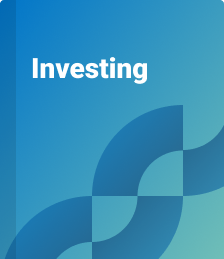Our Investment Planning service offers a comprehensive approach to help clients achieve their financial goals. We understand that every individual has unique aspirations and circumstances, which is why we tailor our investment strategies to meet their specific needs.
Our team of experienced financial advisors work closely with clients to develop a personalized investment plan that aligns with their risk tolerance, time horizon, and financial objectives.
Through our rigorous analysis and research, we identify a range of investment opportunities that have the potential to generate attractive returns.
We carefully consider various investment vehicles like Registered Retirement Savings Plan (RRSP), Tax-Free Savings Account (TFSA), Registered Education Savings Plan (RESP), First Home Savings Account (FHSA), Annuities for lifetime retirement income; and alternative wealth leveraging strategies like using whole life insurance for the Infinite Banking Concept (IBC).
Our experts continuously monitor market trends and adjust the investment plan accordingly to ensure maximum performance and minimize potential risks.
With our Investment Planning service, clients can rest assured that their financial future is in capable hands. Our commitment to transparency, integrity, and professionalism ensures that we always act in the best interest of our clients. Whether they are saving for retirement, funding their children’s education, or seeking wealth preservation, we provide the guidance and expertise needed to navigate the complex world of investing and achieve long-term financial success.


Investing is a key component of financial planning, and it’s important to understand the various investment options available. In Canada, there are several insured products like segregated funds and whole life insurance that offer unique benefits. Additionally, registered funds such as RRSPs, RESPs, TFSAs, and FHSAs provide tax advantages that can enhance your investment returns..
Stocks are shares of ownership in a company. When you buy a stock, you become a shareholder and have the potential to benefit from the company’s success through dividends or an increase in the stock’s price. However, stocks also come with risks—if the company doesn’t perform well, the value of the stock may decrease.
Mutual funds are investment vehicles that pool money from many investors to purchase a diversified portfolio of stocks, bonds, or other assets. They are managed by professional fund managers and offer diversification and professional management but can be subject to fees and potential losses.
Segregated funds, exclusive to Canada, are similar to mutual funds but with an added insurance component. They provide potential growth through exposure to underlying assets and guarantee a certain percentage of the initial investment upon maturity or death. This makes them less risky than stocks and mutual funds but they may have higher fees.
Segregated Funds offer a range of advantages that make them an attractive option for many investors. These advantages include:
Guarantees: One of the main advantages of segregated funds is the guarantee they offer. When you invest in a segregated fund, a certain percentage (usually 75% to 100%) of your initial investment is guaranteed upon maturity or death. This means that even if the market performs poorly, you’re assured to get back a minimum amount of your investment.
Bypassing Probate: When an individual passes away, their estate typically has to go through probate—a legal process that validates the deceased’s will and authorizes the distribution of their estate. This process can be time-consuming and costly. However, if you name a beneficiary for your segregated fund, the proceeds from the fund can bypass probate and go directly to your beneficiary, saving time and probate fees.
Creditor Protection: In certain circumstances, segregated funds may offer protection against creditors. This can be particularly beneficial for business owners or professionals whose personal assets might be at risk from business liabilities. If a preferred beneficiary (such as a spouse, child, grandchild or parent) is named, the investments in segregated funds may be protected from creditors in the event of bankruptcy or lawsuit.
Privacy: Unlike assets that pass through probate, which become a matter of public record, segregated funds offer privacy because they’re not subject to probate. The value of your investment and the identity of your beneficiaries remain confidential.
Risk Tolerance: Stocks can be volatile and may offer higher potential returns but also come with higher risk. Mutual funds offer diversification, which can help mitigate some risk. Segregated funds provide guarantees on your investment, offering the lowest risk among the three.
Investment Knowledge: Stocks require a good understanding of the market and individual companies. Mutual funds are managed by professionals who make investment decisions. Segregated funds combine the growth potential of mutual funds with the security of insurance protection.
Time Commitment: Investing in stocks requires time to research and monitor individual companies. Mutual and segregated funds are managed by professionals, requiring less time commitment from you.
Financial Goals: If your goal is long-term growth, stocks or mutual funds might be suitable. If you’re nearing retirement and need a guaranteed income, segregated funds might be a better choice.
Cost Consideration: Stocks may have lower costs compared to mutual funds and segregated funds, which often include management fees.
At Insurance Wealth Infinite Banking, you’ll discover financial strategies that were never taught in school. Get started towards the road to financial freedom.

If you hear "investing" and think it's something only old guys in suits do, think again. We're here to help you understand the ins and outs of investing so you can get what you need to start growing your money right now.
2
What’s the Difference between Saving and Investing?
At Insurance Wealth Infinite Banking, saving is not part of investing. Saving is something you do if you get a discount on a consumer product or service. Investing is creating wealth from available cash flow.
3
How Should My Financial Goals Impact My Investment Choices?
If you’re clear about your money goals, you can make better investment choices. Quantifying your goals in the dollar amount needed in a certain timeframe (whether it’s a short-term or long-term goal), will create the legacy you’re targeting.
4
How can I invest?
Growing your wealth isn’t just about stocks and real estate…whole life insurance with the use of the Infinite Banking Concept will accelerate your investing strategy!
5
What types of investments are there?
In Canada, there are registered funds that are tax-efficient vehicles like the Registered Retirement Savings Plan (RRSP), Tax-Free Savings Account (TFSA) and the Registered Education Savings Plan (RESP). There are also non-registered funds.
6
How Can I Avoid Getting Scammed?You will not get rich overnight. You will not get rich overnight. YOU WILL NOT GET RICH OVERNIGHT!
“Being wealthy” is really about having financial freedom and building a legacy. Managed the right way and with a plan, wealth can grow with a compund effect. But making bad financial decisions can get you into consumer debt. Be a Wealth Maker, not a Wealth Spender.
1
How Can I Get Rich?“How do I get wealthy?” Well, that depends on how you define being wealthy. On the one hand, there’s looking wealthy, and on the other, there’s being financially free.
2
How Do I Make a Budget?The first step to financial freedom is to spend less than you get paid. But that can be a lot harder than it sounds without a good budget.
3
10 Steps to Creating a Budget (That You’ll Actually Use)Setting up a budget is a crucial first step in getting control of your finances, because it shows you how much you earn, how much you’re spending and lets you plan a path to reducing your debts and increasing your savings.
4
Why (and How) Should I Save?Giving up your morning latté seems like a drag right now, but knowing exactly why you’re doing it will cheer you up and keep you focused.
5
What Are Assets and How Do I Get Them?Not all assets are created equal. Some make you wealthier. And others make you look wealthy but really make you poorer over time.
6
What’s My Best Asset?You’re keen to get hold of those sweet, sweet money-making assets, but you’re flat broke. Good news: the answer is closer than you think.
7
What is Debt and How Do I Get Out of it?You’ll never be wealthy as long as you owe other people more money than you have. So before you can be financially free, you’ve got to get rid of your unhealthy debt.
We’re on a mission to make your money work for you. In these How-To’s we’ll be helping you hack your finances to ‘make it rain’, responsibly.
2
How to Kick Bad Spending HabitsDo your days feel empty when there’s no delivery waiting? Do you find yourself browsing online shops when you’re bored? Is the mall your happy place? You might have a spending problem…
3
How to Live Like a Tourist on a Local’s SalaryIf you can’t be with the one you love, love the one you’re with (except that, in this case, we’re referring to the place you live).
4
How to Grow Your Wealth“This high school dropout made millions with this one trick! Doctors hate him!” Just kidding, we don’t know any get-rich-quick schemes. But we can help you grow your wealth.
5
How to Plan for Death In A Digital WorldStop obsessing about dying, and start obsessing about what comes after (for those left behind) instead!
7
How to Show Your Love on a BudgetEveryone loves a little bit of lovin’, but not everyone likes spending large amounts of money on cheesy stuffed animals or plastic-wrapped candy hearts that will inevitably end up glued to some poor ocean animal.
8
How to plan a winter getaway on a budgetAs the summer days fade behind us, the Netflix & Chill season is officially here! Winter is a great time for cosy adventures, like mini romantic getaways or a staycation with family or friends. Think relaxing under a warm blanket, in front of a fireplace…dreamy, right?
Saving for your future can take many forms. Emergency funds, investments and retirement annuities are all examples of this and will help grow your wealth and peace of mind.
1
How much do I need to retire?Ah, the million dollar question… with (possibly) a million dollar answer. As with most things financial, there’s no really simple way to answer this, but, by going back to basics, we think we can come up with something pretty useful.
It's important to know that not all debt is bad, and some debt can actually help you achieve your future financial goals. The main goal is to know the difference, and make sure you sort out the bad kind so you can get more of the good kind.
1
What is Debt?Debt is money you owe. We’re talking about the big numbers, not the R6.99 you borrowed from your tjom to buy some NikNaks.
2
Is All Debt Bad?Look, having no debt is great. But some debt can be a benefit. So how do you figure the good from the bad?
3
Why Does Bad Debt Happen to Good People?Unhealthy debt doesn’t happen all at once. It starts with a swipe, and ends with your money (and your future money) disappearing into a dark pit.
4
How Do I Find Out How Much Debt I Have?Okay, so you’ve committed to getting rid of all your unhealthy debt. You’re turning over a new leaf, and… and… where do you even start??
5
Can I Use a Credit Card to My Advantage?When it comes to credit cards, people are often strongly divided into the “Yes, They Changed My Life!” and the “No, Cut Them Up!” camps.
6
How Do I Get Out of Debt?Getting out of unhealthy debt is possible, but it sure ain’t easy.
7
What is Debt Counselling?Is it good, or bad? We’ve got the info you need to figure out the debt-busting solution that’s right for you.
8
What Happens to My Debt When I Die?Unfortunately, “‘til death do us part” doesn’t apply to your debt.
Insurance covers risk, and a risk is anything that could happen that would expose you to loss. Basically, when there’s an asset involved (something of value), there’s also risk.
1
What is Insurance?Insurance covers risk, and a risk is anything that could happen that would expose you to loss. Basically, when there’s an asset involved (something of value), there’s also risk.
3
What Types of Insurance Are There?Many people make the mistake of either getting insurance they don’t actually need or not getting the right types of insurance for their needs.
5
How Much Cover Do I Need?Discovering that you, or someone you depend on, doesn’t have enough insurance can really be a tragedy on top of a tragedy, because you usually only find out when things go wrong.
6
How Do Claims Work?From paperwork to phone calls to long queues at government buildings. The many things you sometimes have to do before you can even make a claim, can make an already bad situation feel so much worse. Luckily, there are some things you can do now that’ll make it easier later.
7
5 Steps to Getting InsuredThink of this article as one of those vitamin-enriched, whole-wheat loaves of bread: an honest, wholesome guide to getting insurance.
Most People will need Life Insurance at some point in their lives, so it’s likely you’ll need life insurance. What’s most important is that you understand the key life milestones that impact what and how much cover you need.
1
Why Even Young People Need Life Insurance
The reasons are simple – when you’re younger, you’re most likely healthy and qualify for coverage; when you’re younger, insurance premiums are much lower; and, the earlier you start a whole life policy, your policy has many years to accrue dividends in the cash value, tax-free…and can be accessed tax-free while you’re still alive!
2
Why you Need Life Insurance When Buying a Home
Although buying your first home can be a milestone in your life, it can also be the most stressful event in your life. Getting term life insurance for the term of the mortgage will ensure your spouse or beneficiary will not end up with a huge debt.
3
What New Parents Need to Know About Life Insurance
Providing for your child isn’t just about taking care of their current needs; it’s about preparing for their future needs too. Starting a whole life policy for your child can build a significant retirement pension (IRP) or access to the cash value to use for a down payment or other investments (IFA).
Insurance can be complex, but with Insurance Wealth Infinite Banking, strategic Insurance Planning will build a tax-efficient legacy for your loved ones.